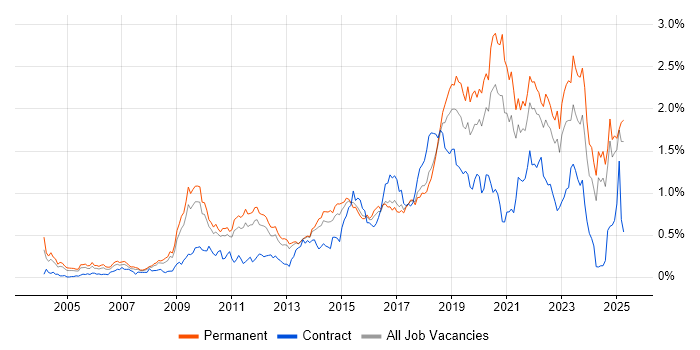PostgreSQL (Postgres)
England > East of England
The table below provides summary statistics for permanent job vacancies advertised in the East of England requiring PostgreSQL skills. It includes a benchmarking guide to the annual salaries offered in vacancies that cited PostgreSQL over the 6 months leading up to 2 May 2025, comparing them to the same period in the previous two years.
| 6 months to 2 May 2025 |
Same period 2024 | Same period 2023 | |
|---|---|---|---|
| Rank | 133 | 150 | 122 |
| Rank change year-on-year | +17 | -28 | +6 |
| Permanent jobs citing PostgreSQL | 36 | 75 | 122 |
| As % of all permanent jobs advertised in the East of England | 1.21% | 1.23% | 2.21% |
| As % of the Database & Business Intelligence category | 8.89% | 8.00% | 12.01% |
| Number of salaries quoted | 24 | 61 | 45 |
| 10th Percentile | £27,150 | £29,750 | £42,500 |
| 25th Percentile | £29,250 | £45,000 | £45,000 |
| Median annual salary (50th Percentile) | £55,000 | £65,000 | £72,500 |
| Median % change year-on-year | -15.38% | -10.34% | +16.00% |
| 75th Percentile | £58,750 | £92,500 | £80,000 |
| 90th Percentile | £75,750 | - | £92,500 |
| England median annual salary | £75,000 | £65,000 | £75,000 |
| % change year-on-year | +15.38% | -13.33% | +7.14% |
All Database and Business Intelligence Skills
East of England
PostgreSQL falls under the Databases and Business Intelligence category. For comparison with the information above, the following table provides summary statistics for all permanent job vacancies requiring database or business intelligence skills in the East of England.
| Permanent vacancies with a requirement for database or business intelligence skills | 405 | 937 | 1,016 |
| As % of all permanent jobs advertised in the East of England | 13.65% | 15.43% | 18.41% |
| Number of salaries quoted | 303 | 792 | 550 |
| 10th Percentile | £29,550 | £28,250 | £36,748 |
| 25th Percentile | £42,500 | £35,529 | £45,000 |
| Median annual salary (50th Percentile) | £53,000 | £50,000 | £57,500 |
| Median % change year-on-year | +6.00% | -13.04% | +9.52% |
| 75th Percentile | £72,500 | £64,063 | £70,000 |
| 90th Percentile | £80,000 | £77,500 | £85,000 |
| England median annual salary | £62,500 | £57,500 | £65,000 |
| % change year-on-year | +8.70% | -11.54% | +8.33% |
PostgreSQL
Job Vacancy Trend in the East of England
Job postings citing PostgreSQL as a proportion of all IT jobs advertised in the East of England.

PostgreSQL
Salary Trend in the East of England
3-month moving average salary quoted in jobs citing PostgreSQL in the East of England.
PostgreSQL
Salary Histogram in the East of England
Salary distribution for jobs citing PostgreSQL in the East of England over the 6 months to 2 May 2025.
PostgreSQL
Job Locations in the East of England
The table below looks at the demand and provides a guide to the median salaries quoted in IT jobs citing PostgreSQL within the East of England region over the 6 months to 2 May 2025. The 'Rank Change' column provides an indication of the change in demand within each location based on the same 6 month period last year.
| Location | Rank Change on Same Period Last Year |
Matching Permanent IT Job Ads |
Median Salary Past 6 Months |
Median Salary % Change on Same Period Last Year |
Live Jobs |
|---|---|---|---|---|---|
| Cambridgeshire | +15 | 13 | £47,500 | -32.14% | 41 |
| Norfolk | +25 | 9 | £30,500 | -4.69% | 3 |
| Hertfordshire | +27 | 7 | £57,500 | - | 7 |
| Essex | +26 | 7 | £57,500 | +24.32% | 9 |
| PostgreSQL England |
|||||
PostgreSQL
Co-occurring Skills and Capabilities in the East of England by Category
The follow tables expand on the table above by listing co-occurrences grouped by category. The same employment type, locality and period is covered with up to 20 co-occurrences shown in each of the following categories:
|
|
||||||||||||||||||||||||||||||||||||||||||||||||||||||||||||||||||||||||||||||||||||||||||||||||
|
|
||||||||||||||||||||||||||||||||||||||||||||||||||||||||||||||||||||||||||||||||||||||||||||||||
|
|
||||||||||||||||||||||||||||||||||||||||||||||||||||||||||||||||||||||||||||||||||||||||||||||||
|
|
||||||||||||||||||||||||||||||||||||||||||||||||||||||||||||||||||||||||||||||||||||||||||||||||
|
|
||||||||||||||||||||||||||||||||||||||||||||||||||||||||||||||||||||||||||||||||||||||||||||||||
|
|
||||||||||||||||||||||||||||||||||||||||||||||||||||||||||||||||||||||||||||||||||||||||||||||||
|
|
||||||||||||||||||||||||||||||||||||||||||||||||||||||||||||||||||||||||||||||||||||||||||||||||
|
|
||||||||||||||||||||||||||||||||||||||||||||||||||||||||||||||||||||||||||||||||||||||||||||||||
|
|
||||||||||||||||||||||||||||||||||||||||||||||||||||||||||||||||||||||||||||||||||||||||||||||||
